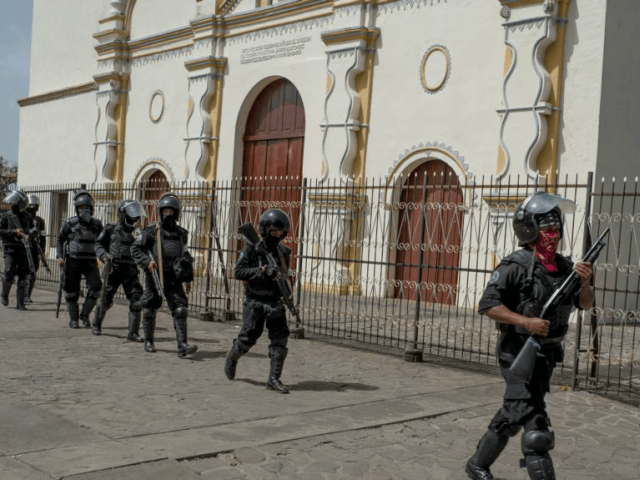An estimated 200 student protesters deemed “terrorists” by the communist government of Nicaragua safely walked out of a Catholic Church after it was besieged for hours over the weekend by forces loyal to Nicaraguan dictator Daniel Ortega in an incident that left two dead and dozens wounded.
During a weekend marred by violence, the episode involved Ortega forces attacking students who sought refuge at the Jesus of Divine Mercy church in the capital city of Managua began Friday and lasted about 15 hours into Saturday.
“It was a really hard night. They discharged their entire heavy arsenal against stones and mortars,” a sobbing young man told the Associated Press (AP) on condition of anonymity for fear of reprisals. “They wanted to kill us all.”
“For breakfast, they give us a rain of bullets. Endless bursts of bullets from the park at the church continue,” one of the students, identified as Ismael Lopez, wrote on Twitter while trapped inside the church, according to MWC News.
Authorities reunited the more than 200 students who safely escaped the ordeal with their families on Saturday, AP reported Monday, explaining:
The students had sought refuge in a local church after police forced them out of the National Autonomous University of Nicaragua, which had been occupied during two months of protests against the government of President Daniel Ortega.
On Monday, National Public Radio (NPR) added:
For two months, students at the university in Managua have set up barricades during protests that have drawn the wrath of pro-government forces. On Friday, about 200 students on the sprawling campus were pinned down by police and paramilitaries into a nearby Catholic church that they had been using as a field hospital.
The violence continued on Sunday as part of the communist government’s “Operation Clean-Up,” reportedly considered by President Ortega and his vice-president Rosario Murillo an act of self-defense against “terrorism,” El Periodico from Spain reported Monday.
Several operation-linked attacks that day attributed to paramilitary forces, and the national police loyal to Ortega, left ten people dead, including six civilians and four anti-riot police officers, the newspaper noted, citing the Nicaraguan Association for Human Rights (ANPDH).
El Periodico acknowledged that Masaya, the cradle of the communist Sandinista movement that made Ortega the top leader in Nicaragua, was at the epicenter of the wave of violence on Sunday.
Ortega, a revered leader of the leftist Nicaraguan revolutionary movement, is now targeting the same people he claimed to have liberated from alleged oppression at the hands of U.S.-backed President Anastasio Somoza in the late 1970s.
The Nicaraguan city of Masaya was reportedly among the first to rise against the communist president after pro-Ortega militiamen looted businesses and terrorized locals to suppress protesters.
On Tuesday, the United Nations human rights office condemned the law against so-called terrorism approved by the Parliament of Nicaragua, arguing that it can potentially be used to criminalize peaceful protests.
“The text is very vague and allows a broad interpretation that could lead to the inclusion (in the definition of terrorist) of people who are simply exercising their right to protest,” the U.N. office declared, according to the EFE news agency.
Since the clashes between protesters and armed groups loyal to Ortega began on April 18 over now-rescinded public pensions reforms, the human rights group ANDPH reportedly believes confrontations have killed more than 350 people.
According to the Inter-American Commission on Human Rights (IACHR), another 1,800 have been injured.
In June, the Agence France-Presse (AFP) agency reported that the communist government had imprisoned about 2,000 people since the start of the popular uprising against Ortega in April.
Reporter Maria Martin told NPR about the ongoing deadly situation in Nicaragua: “Students have been at the center of anti-government demonstrations since they began April 18. What started as a ‘protest against now-rescinded changes in public pensions’ became ‘a full-fledged call to end the authoritarian rule.'”
While pro-Ortega forces reportedly accuse the protestors of trying to stage “a coup d’etat” against the communist leader, human rights groups have blasted the Nicaraguan regime for using excessive force against the demonstrators.
“We are governed by a genocidal couple that has sunk the country under a wave of state terrorism. To join a peaceful protest for them is reason enough to order your death,” Zayda Hernandez, one of the students who risked her life in mass protests against Ortega in Nicaragua, told reporters last week, the Miami Herald revealed.
During the same news conference, Victor Cuadras, another student protester, reportedly claimed, “Cuban and Venezuelan intelligence agents have been active in Nicaragua since Ortega assumed power in 2007.”
“Castro copied his recipe for repression and harassment in Venezuela, and now they are doing it in Nicaragua,” Cuadras told reporters. “There are many people who, while being tortured, heard the accents of Venezuela and Cuba in the clandestine prisons.”

COMMENTS
Please let us know if you're having issues with commenting.